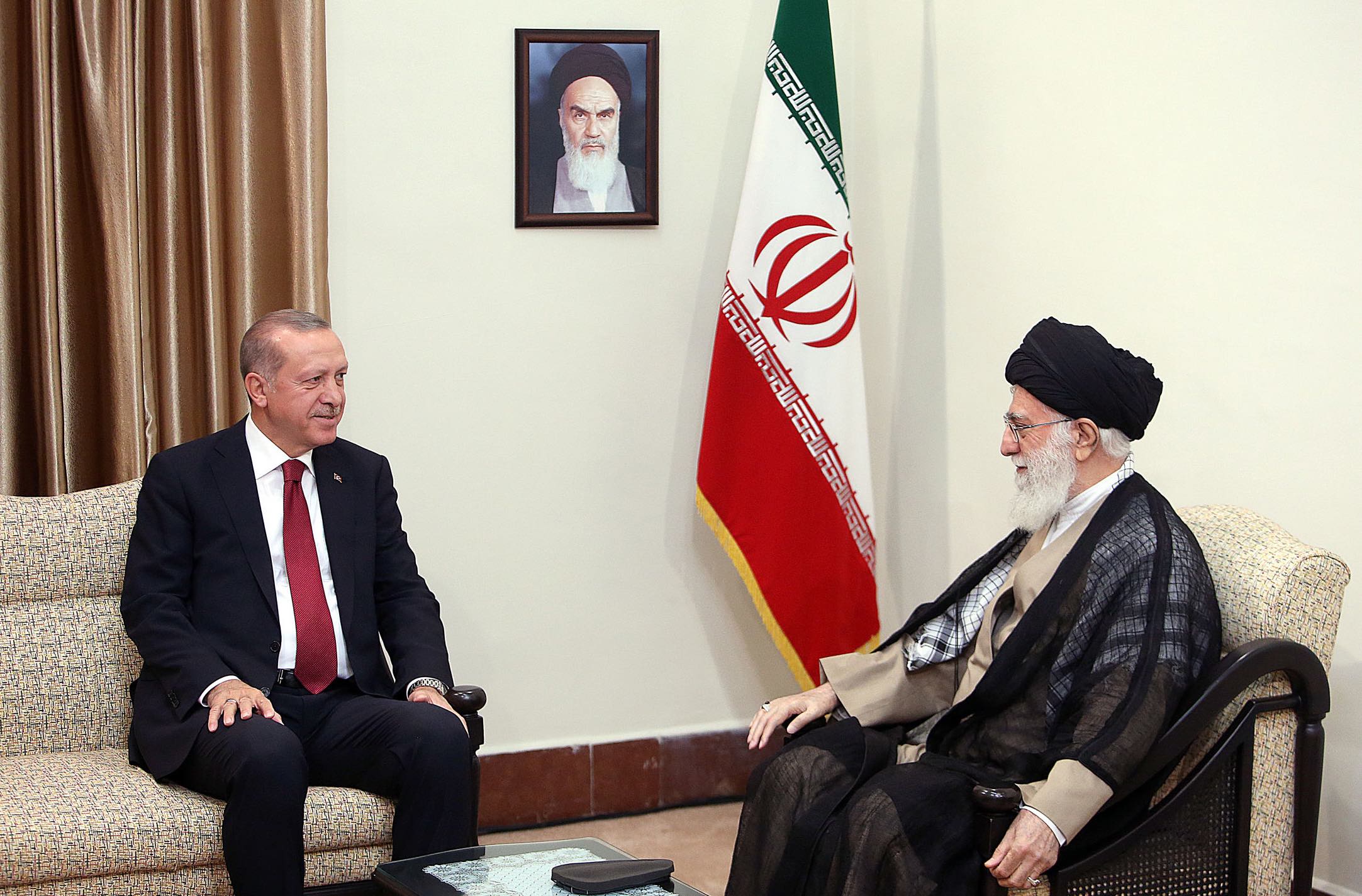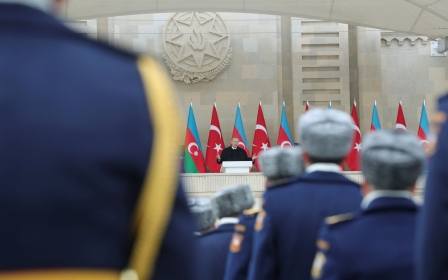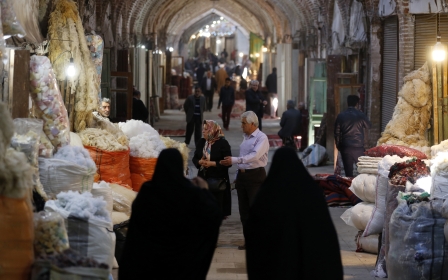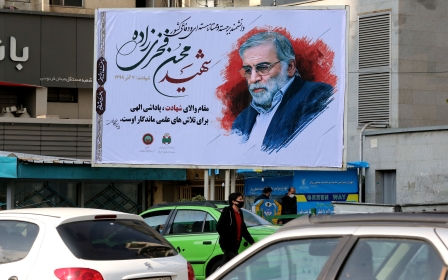Erdogan attracts Iran's rancour over nationalist Azerbaijani poem
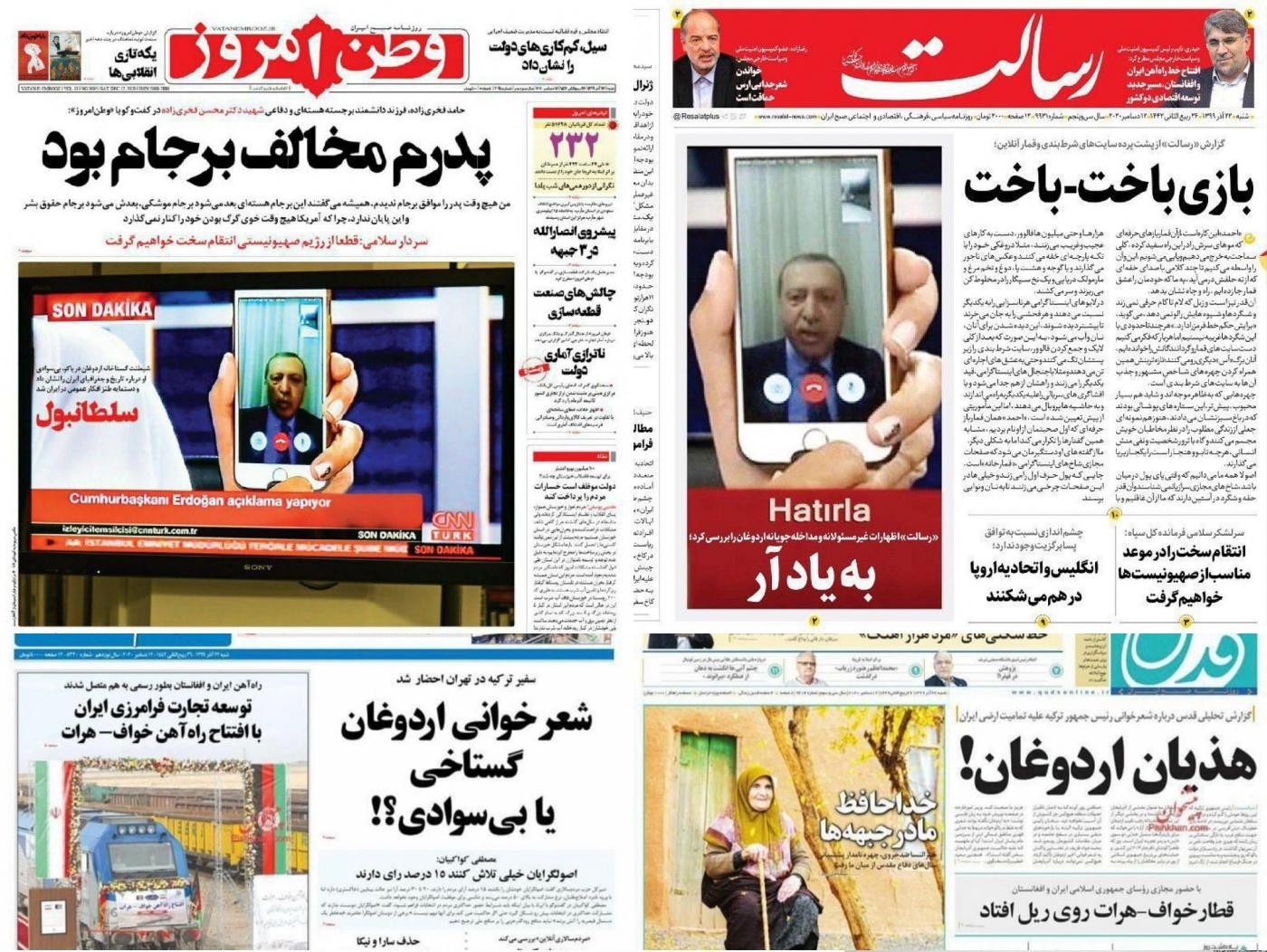
Tehran’s outrage over a nationalist Azerbaijani poem recited by Recep Tayyip Erdogan last week in Baku has spiralled into continued verbal assaults on the Turkish president by officials close to Iran's supreme leader.
The anonymous folkloric poem, which speaks about Azerbaijani mourning for the Aras river, is considered by Tehran as a territorial claim on South Azerbaijan, which is currently in Iranian territory.
Erdogan read the poem as he was attending a victory parade following Azerbaijan’s victory over Armenia in the Nagorno-Karabakh war.
The Iranian backlash began on Friday, as Foreign Minister Mohammad Javad Zarif led a social media campaign blasting Erdogan, who quoted parts of the poem related to Lachin, which is in near Nagorno-Karabakh, but not those about the South Azerbaijan.
Regardless of the passages selected, Erdogan's recital caused widespread acrimony. At least 100,000 Persian and Turkish tweets were sent by Iranians who said Erdogan should shut up.
New MEE newsletter: Jerusalem Dispatch
Sign up to get the latest insights and analysis on Israel-Palestine, alongside Turkey Unpacked and other MEE newsletters
Both sides summoned each other’s ambassadors in their respective capitals, and the countries appeared to have patched things up after Turkish Foreign Minister Mevlut Cavusoglu spoke to Zarif by phone on Saturday, insisting that the recital wasn't directed at Iran.
The Iranian embassy in Ankara in a subsequent statement said the whole issue was a misunderstanding.
However, the attacks against Erdogan didn’t end there. Most notably, criticism then came from Hossein Shariatmadari, editor-in-chief of Kayhan daily, which is considered as a mouthpiece for Supreme Leader Ali Khamenei.
Shariatmadari, in a column published on Sunday, said the poem was actually making another point: Azerbaijan used to belong to Iran. And Erdogan’s poem was actually calling on Azerbaijan to return to the homeland.
He then went on to target the Turkish president personally.
“Erdogan's problem is not only ignorance of the most obvious historical issues, but a more fundamental problem is his very little use of political intelligence and understanding,” he wrote.
Shariatmadari wasn’t alone. Saeed Mohammad, commander of the Islamic Revolutionary Guards Corps’ construction conglomerate, Khatam al-Anbiya, said in a tweet that Erdogan was seeking the disintegration of Iran.
“They are sleeping like wolves around the country to divide Iran,” he said.
Majid Feyzollahi, a diplomat at the Iranian embassy in Ankara, also raised eyebrows in the Turkish capital by tweeting on Sunday referring to towns and regions in Turkey and other countries neighbouring Iran: “Not only Azerbaijan but from Shiraz to Balkh, Khujand and Samarkand, from Khorasan to Tabriz, Ganja and [the Turkish city of] Konya are all Iranian.
“Iran means this glorious world of meaning and culture that includes all the tribes of the region, and these are the creators of Iran."
He later deleted the tweet.
The strong and persistent reactions from Iran have left observers in Turkey scratching their heads.
The prevailing perception in Turkey is that Iran is trying to appear strong following the assassination of its top nuclear scientist last month, an operation unofficially claimed by Israel.
Observers say the changing equilibrium in Nagorno-Karabakh and Turkey’s major role in the war in favour of Baku irritated Tehran.
“Tehran used to host diplomatic talks between Armenia and Azerbaijan, now they don’t have any presence in Karabakh, neither militarily nor diplomatically," Adem Yilmaz, an academic specialising on Iran, told Middle East Eye.
“Its competitor Turkey has taken steps that changed the balance in the region. Strong Turkish and Azerbaijani cooperation to the north of Iran is concerning for them.”
'Tehran used to host diplomatic talks between Armenia and Azerbaijan, now they don’t have any presence in Karabakh, neither militarily nor diplomatically'
- Adem Yilmaz, Iran expert
Many also believe Khamenei's apparent involvement in the spat is a symptom of Persian nationalism and pride, rather than something else.
“It might suddenly occur to many that Persian nationalism is a defining feature of the Islamic Republic along with the Shia sect,” Taha Kermani, a Turkish-Iranian journalist, told MEE.
“Iran is in a time of great weakness. It’s losing power abroad and has problems within. Current tensions are also leading to rising discontent among Iranian Turks.”
Iran is the home of 15-20 million Iranian Azerbaijanis who have strong cultural and ethnic links to both Turkey and Azerbaijan.
Turkey has rejected the criticism.
"We condemn the use of aggressive language towards our president and our country over the recitation of a poem, whose meaning has been deliberately taken out of context," said Erdogan's senior aide Fahrettin Altun in a formal press release on Saturday.
"It must not be forgotten that Turkey stood in solidarity with the Iranian state and people, despite the risk of having to endure international pressure, at difficult times for Iran."
Tensions growing
Tensions are bubbling between the two countries elsewhere.
On Monday, Turkey also announced the arrest of 13 suspects accused of perpetrating the kidnapping of Iranian dissident Habib Farajollah Chaab in Istanbul in October.
The police took the suspects into custody in November following an investigation on a separate case.
A Turkish official told Washington Post on Sunday that Chaab's abduction was orchestrated by the notorious drug trafficker Naji Sharifi Zindashti at the behest of Iranian intelligence.
Chaab’s abduction was the third such incident in the country in the last three years blamed on Tehran, following the killing of two other high-profile Iranian dissidents.
Middle East Eye delivers independent and unrivalled coverage and analysis of the Middle East, North Africa and beyond. To learn more about republishing this content and the associated fees, please fill out this form. More about MEE can be found here.


